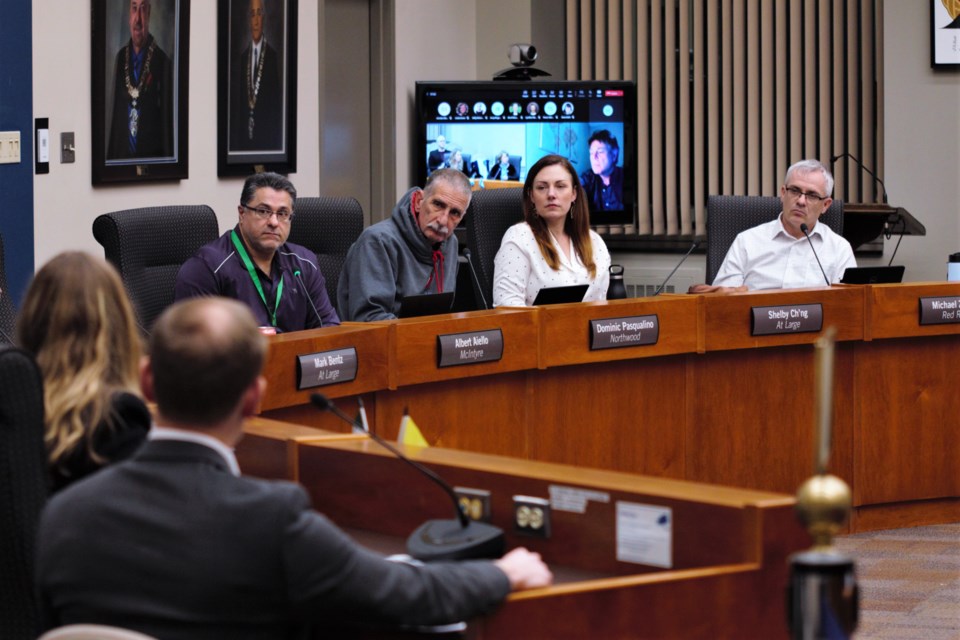THUNDER BAY — Thunder Bay’s city council has affirmed a new approach to homeless encampments in the city, prioritizing a health and social services response and rejecting evictions of the homeless from public lands other than in “exceptional circumstances.”
In a report presented to council last week, staff recommended the city "adopt a human rights-based approach."
The increasing visibility of encampments in the city has prompted complaints from some residents, and concerns over campers’ safety, with reports of harassment against the homeless.
Council’s vote on Monday solidifies an approach that began last year as a pilot project and saw outreach workers regularly visit encampment sites, with the city and police service allowing those sheltering on public lands to remain in place.
That responded to calls for a more compassionate response from local advocates, as well as recent legal decisions that challenge municipalities’ ability to evict the homeless from public spaces.
City staff have pointed in particular to an Ontario Superior Court ruling earlier this year that struck down Waterloo’s encampment bylaw, finding the homeless had a Charter right to shelter themselves given that adequate housing alternatives were not available.
Asked what set Thunder Bay’s approach apart from Waterloo's, manager of community strategies Cynthia Olsen said, “One of the key differences is not erring on the side of enforcement.”
“It’s a human rights-based approach, which means engaging with individuals where they’re at, making an assessment on their needs to identify individualized care plans, which includes referrals and connections to housing.”
Coun. Mark Bentz said the case law clearly required the city to reexamine its approach.
“It’s not as simple as just saying, ‘We’ve got a bylaw, you can’t be here,’” he said. “The legal system in Ontario is saying that’s not good enough, so we can’t just go in and clear these places out because we have a bylaw — that bylaw is not going to be upheld by the courts.”
The city now works with agencies including lead partner Elevate NWO, which has received encampment outreach funding, to ensure encampments are visited within two days after they are reported.
Residents are invited to call (807) 625-2195 to report a possible encampment.
Outreach workers visit the sites regularly, offering items like health supplies, food, and tents to meet short-term needs, and working to connect encampment residents with other services including housing.
City staff reported over 50 people found some form of housing through the program last year. Elevate has previously stated the vast majority of those people remained in housing during the six months in which the organization follows their status.
When encampments are abandoned, city crews are designated to arrange cleanup within three days.
The city could still remove encampments under “exceptional circumstances,” staff reported, but the city has not yet defined that term.
The approach has been guided by the city-led Response to Unsheltered Homelessness Task Force, which includes leaders from local government, social services, emergency services, and public health.
Mayor Ken Boshcoff was among councillors welcoming that work and the city's new policy.
“I thank those who have already been in the trenches,” he said. “It’s up to us now, because it really has hit the fan. We’re at a very difficult turning point.”
“There’s a large part of the population that’s being isolated. In front of city hall … every day, there’s large aggregations of people, which is leading to some imaging problems for our community.”
“It’s something I hope we all support,” Bentz said of the human rights-based approach. “We should be taking care of people who have no shelter – I mean, it’s just what humans should do with other humans.”
"This is going to cost money, though, and the province can’t just hide behind, ‘Let the municipality deal with it’ — and neither can the federal government, for that matter."
Coun. Kristen Oliver moved a successful amendment referring the issue to the city’s intergovernmental affairs (IGA) committee “so we can really engage in a more robust advocacy and lobbying effort to work with the province and to get those discussions going.”
The city has previously called on the province to expand funding for addictions and mental health treatment, as well as homelessness prevention.
Olsen said while the city’s approach had helped house people, it’s also limited by shortages of affordable and supportive housing.
“This is not a quick win — these things do take time,” she said. “Spaces continue to fill up, waitlists continue to get longer.”
Oliver agreed with colleagues that while the province bears the lion’s share of the responsibility on the issues, the city also needs to continue stepping up its own efforts – and spending.
Council’s approval Monday of $20,000 in next year’s budget to provide amenities like porta-potties and access to shower and laundry facilities for people living in encampments “only scratches the surface," she said.
“I think the public wants us to do something,” agreed Coun. Andrew Foulds. “I share the opinion that a lot of this stuff belongs in other orders of government, but I do think we need to be a legitimate partner. I’m not entirely sure that $20,000 symbolizes the seriousness that I think we all believe this issue has.”
Bentz asked residents who have concerns over encampments to show "tolerance and patience."
“Really, what I’d like to ask the community for is some compassion here,” he said. “It’s going to be difficult for some people this summer, because those encampments will be there, but we’re going to deal with them, and we’re working towards a solution.”
Staff recommended further study on the potential for designated encampment sites in the city, an idea in which several groups have expressed interest.
Nishnawbe Aski Nation has suggested the city donate land dedicated for safe encampments and land-based healing activities, offering to collaborate on the initiative.
Staff plan to return to council by early 2024 with a report on the question.



